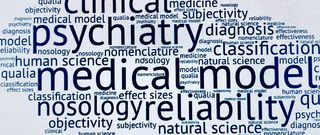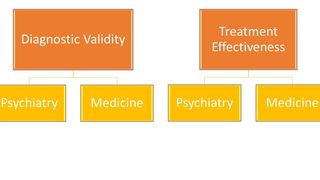Psychiatry
A Review of "The Medical Model in Mental Health"
A new book debunks psychiatry skeptics and reaffirms its role in medicine.
Posted August 13, 2019

In Ahmed Samei Huda’s book, The Medical Model in Mental Health, the author effectively situates the field of mental health within the purview of the medical model. Huda provides a critique of aspects of psychiatry while making sure to present a balanced, objective look at the current status of the field. However, the reader should not let Huda’s reader-friendly jargon-free writing lull them into a belief that this text doesn’t contain rigorous, consequential data.
As an example of Huda’s well-rounded, non-biased, open approach, he illustrates the arbitrariness of MDs having the most authority in connection to mental health, noting that if social workers and psychologists had been well-developed, specialized professions in the Victorian era, then they would have likely been the ones in charge of the asylums – not the MDs.
He presents the definition of the construct of a psychopathological syndrome well and clearly, highlighting lack of agreement in the field and subjective inherent factors.
Subjectivity and the Medical Model
Huda asserts that subjectivity is always a necessary component of the medical model and classifies two types of applications for the medical model: practice and disease. Huda also identifies the power differential between doctor and patient and clarifies the sources of doctor authority, an important feature of the doctor-patient relationship often de-emphasized in the literature.
Overall, Huda advocates the use of multiple theoretical frameworks – not just the medical model – for both explaining patients' presentation and intervention. He advocates the use of a humanistic psychiatric framework for the conceptualization and treatment of mental illness/disease. Huda also holds – his central conclusion – that the medical model of mental health is on firm empirical, theoretical, and philosophical ground within medicine and natural science.
Throughout the text, Huda clarifies the distinction between medical knowledge and clinical knowledge, evidently the standard line taught in medical school textbooks, namely that medical knowledge is semantic and clinical knowledge is experiential – in short.
Huda provides a rational-based, experience near account of how diagnosis works in clinical practice and why it’s important. Huda offers a great description of how everyday mental health practice works in the real world with everyday accessible language with an emphasis on the use of multi-disciplinary teams in mental health care. Huda’s book may be rare for its respectful, appreciative, and equanimous view towards other mental health professionals, emphasizing the importance of what they can bring to the table.

Comprehensive Data Contrasting Psychiatry and Medicine: Etiology, Reliability, and Treatment
Huda closes with a brilliant chapter examining psychiatric diagnosis – psychometrically - in direct comparison with the rest of medicine.
For example, Huda presents a list of medical diseases for which the cause or etiology is essentially unknown – but to varying degrees of unknowability. Below are some of the poorly understood or wholly unknown medical diseases that stand out: Polycystic Ovarian Syndrome, Type 1 Diabetes, and Hypertension.
In another classification of diseases, he lists the following under the header “functional medical conditions,” i.e, IBS, Chronic Fatigue Syndrome, and Fibromyalgia, which Huda rightly intimates may overlap with psychopathological constructs, an interesting, albeit controversial, hypothesis.
Huda spends the remainder of the book systematically summarizing the evidence for:
- The reliability of psychiatric diagnosis as compared to the reliability of general medical conditions
- The treatment effectiveness of psychiatric (medication) interventions on psychiatric disorders as compared to (a) general medical interventions as well as (b) psychotherapy
- The effects and side effects of (a) anti-depressants as well as (b) anti-psychotics, a topic wrought with social media controversy

Some takeaways from this book are that psychiatric diagnosis is (a) at least as reliable as medical diagnoses in general, (b) at least as effective in treating psychiatric diagnoses as medical interventions are effective at treating medical disorders, and (c) psychotherapy is promising, putatively as effective – if not more – than psychiatric medication for some clinical syndromes. To see the data, one will have to check the hardcopy of the book.
Huda, an advocate of the prototype matching decision-making process for both medicine and psychiatry, successfully and solidly situates psychiatry firmly within the practice and theory of medicine, i.e., within the medical model in his book.
Epidemiology, clinical psychology, public health, and any other students or professionals interested in a definitive source listing of statistics relevant to reliability of medical versus psychiatric diagnosis as well as medical treatment versus psychiatric treatment and psychotherapy treatment can find a veritable reference in Huda’s text.
It is a valuable resource to researchers and teachers in the field. The book will also be of interest to the general patient interested in understanding how medical and psychiatric decisions are made, systems of care, and the interactions between different mental health care professionals. Scholars interested in the philosophy of psychiatric nosology may also enjoy the book.
When all is said and done, Huda fills a much-needed gap in the research literature on psychiatry effectiveness relative to general medicine. In psychotherapy research, Wampold published “The Great Psychotherapy Debate” in which he summarized existing effect sizes for the different psychotherapeutic treatments, an invaluable reference for researchers and in some ways is analogous to Huda’s work.
In addition, Meyer et al. (2002) published an article in American Psychologist in which they summarized the effect sizes for a range of relationships between variables, including psychiatric medication-outcome, psychotherapy-outcome, personality testing, and more.
Huda’s book provides a cutting edge, state-of-the-art summary and evaluation of diagnostic reliability and outcome data that will help patients and researchers alike interpret new studies, as Huda provides an excellent reference point for assessing the magnitude of effects. Dr. Huda's work is a breath of fresh air in what can seem like the social media disinformation whirlpool.




